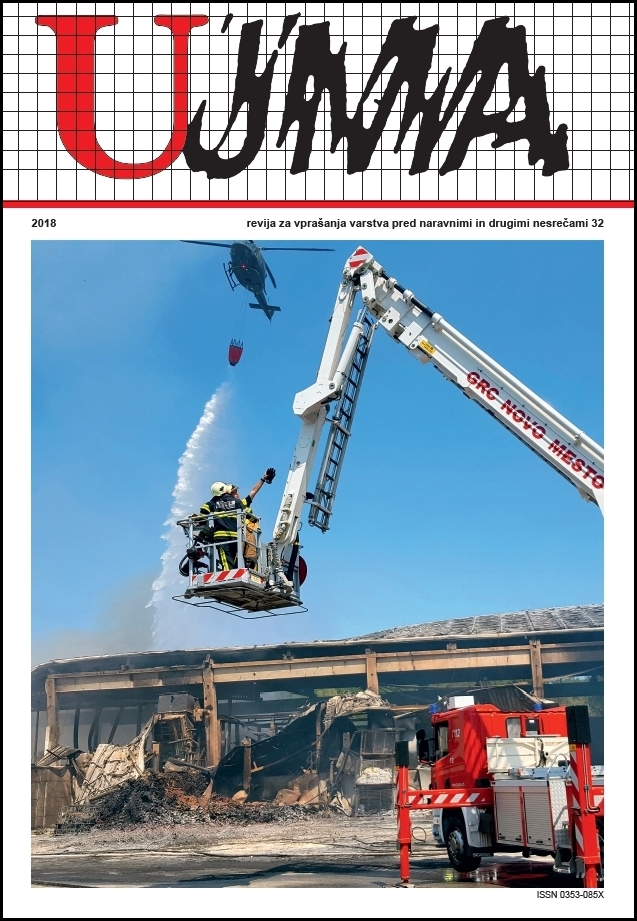TRAINEES IN THE EMERGENCY MANAGEMENT SYSTEM
Abstract
Education is crucial for the development of every society. Training and education in the emergency management system are defined in the Protection against Natural and Other Disasters Act. Traineeship at the Emergency Management Department at the City Administration of the city of Ljubljana is divided into three parts: a general part, a special part, and a final written assignment. The trainees’ work and training are monitored by mentors. At the end of their training, the trainees defend their final written assignments before a committee. The tasks faced by trainees and beginners in the emergency management system are extremely diverse. The fact that this area is part of the Municipal or City Administration only adds to the diversity and complexity of the tasks, and increases the responsibility of the people carrying them out. By broadening the spectrum of tasks, the required set of knowledge and skills also expands. Consideration should be given to the establishment of a comprehensive approach to the training and education of public employees in the emergency management system, whose primary focus would be the management and decision-making process before, during and after emergencies. The majority of duties related to the training and education of trainees and beginners in the public services of the emergency management system has been taken on by superiors, mentors and other co-workers. Their knowledge, experience, views, and guidance substantially contribute to the professional development of trainees in the emergency management system.
References
Bukinac, Z., 1993. Koncept usposabljanja za zaščito in reševanje. Ujma 7: 204–207.
Boulder County Careers, 2017. Emergency Management Coordinator. https://www.governmentjobs.com/careers/boulder (27. 10. 2017).
Dečar, M., 2007. Izobraževanje in usposabljanje zaposlenih v podjetju Unior, d. d., Zreče, samozaložba, 9.
Izobraževanje in usposabljanje, 2014. Uprava republike Slovenije za zaščito in reševanje. Ministrstvo za obrambo. http://www.sos112.si/slo/iczr_page.php?src=iz11.htm (5. 4. 2018).
Jeraj, J., Novak, L., 2016. Uporaba družbenih medijev ob nesrečah. Ljubljana, Ujma 30: 171–179.
Jereb, J., 1998. Teoretične osnove izobraževanja. Kranj, Moderna organizacija, 177.
Konferenca o kriznem upravljanju v času naravnih nesreč. 2017. Mestna občina Ljubljana. https://www.ljubljana.si/sl/mestna-obcina/mestnauprava/oddelki/oddelek-za-zascito-resevanje-in-civilno-obrambo/novice/konferenca-o-kriznem-upravljanju-v-casu-naravnih-nesrec/ (25. 3. 2018).
Možina, S., Svetlik, I., Jamšek, F., Zupan N., Vodovnik Z., 2002. Management kadrovskih virov. Ljubljana, Fakulteta za družbene vede.
Novak, L., Jeraj, J., 2016. Projekt Athena – možnost družbenih omrežij v času izrednih razmer V: Digitalni podatki, GIS v Sloveniji 13. Ciglič R. (ur. in sod.). Ljubljana, Založba ZRC: 265–272.
Obvezno usposabljaje za imenovanje v naziv. 2018. Upravna akademija. Ministrstvo za javno upravo. http://www.mju.gov.si/si/upravna_akademija/obvezno_usposabljanje_za_imenovanje_v_naziv/ (28. 3. 2018).
Programi usposabljanja, 2014. Izobraževalni center za zaščito in reševanje RS. Uprava Republike Slovenije za zaščito in reševanje. Ministrstvo za obrambo. http://www.sos112.si/slo/page.php?src=iz18.htm (5. 4. 2018).
Uredba o organiziranju, opremljanju in usposabljanju sil za zaščito, reševanje in pomoč Ur. l. RS št. 102/2009.
Zakon o varstvu pred naravnimi in drugimi nesrečami Ur. l. RS št. 51/06.
Downloads
Published
Issue
Section
License

This work is licensed under a Creative Commons Attribution-NonCommercial-NoDerivatives 4.0 International License.
The articles are made available to the public under Creative Commons Attribution-NonCommercial-NoDerivatives 4.0 International (CC BY-NC-ND 4.0).


